Best Clinically Proven Toothpastes for Sensitive Teeth
 With so many toothpaste options, choosing the right one can feel overwhelming. If you have sensitive teeth, it’s essential to pick a toothpaste that’s gentle and soothing, avoiding abrasive formulas that could make your problem worse.
With so many toothpaste options, choosing the right one can feel overwhelming. If you have sensitive teeth, it’s essential to pick a toothpaste that’s gentle and soothing, avoiding abrasive formulas that could make your problem worse.
Keep reading to learn how tooth sensitivity works, the key ingredients to look for in anti-sensitivity toothpaste, and discover the best clinically proven options that offer fast, long-lasting relief.
Our Top Recommendations
1. Sensodyne Rapid Relief
2. Sensodyne Repair and Protect (Novamin)
3. Tom’s of Maine Rapid Relief Sensitive (Fluoride-Free)
4. Parodontax Toothpaste Clean Mint:
In this article:
1. Why Do Teeth Become Sensitive?
2. How Do Desensitizing Toothpastes Work?
3. Best Toothpaste for Sensitive Teeth
4. The Toothpastes to Avoid When Having Sensitive Teeth
5. Things to Consider When Dealing with Sensitive Teeth
6. Best Practices for Sensitive Teeth
7. When to See Your Dentist?
Why Do Teeth Become Sensitive?
To understand how desensitizing toothpastes work, we must first know why teeth become sensitive in the first place.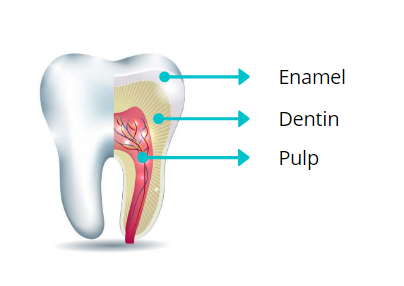
Enamel is the outermost layer and the hardest tissue in our body—even tougher than bone. It helps shield our teeth from the acidic, hot, or cold environment inside the mouth.
Tooth sensitivity happens when the dentin, the layer beneath the enamel, becomes exposed. This exposure often occurs when the enamel breaks down due to factors like cavities, tooth wear, or trauma. Without enamel protection, the teeth become more sensitive, especially when eating or drinking something hot or cold.
Why is Dentin More Sensitive Than Enamel?
Dentin is more sensitive because it lies directly above the tooth’s nerves, so any stimulation can easily reach them, causing pain.
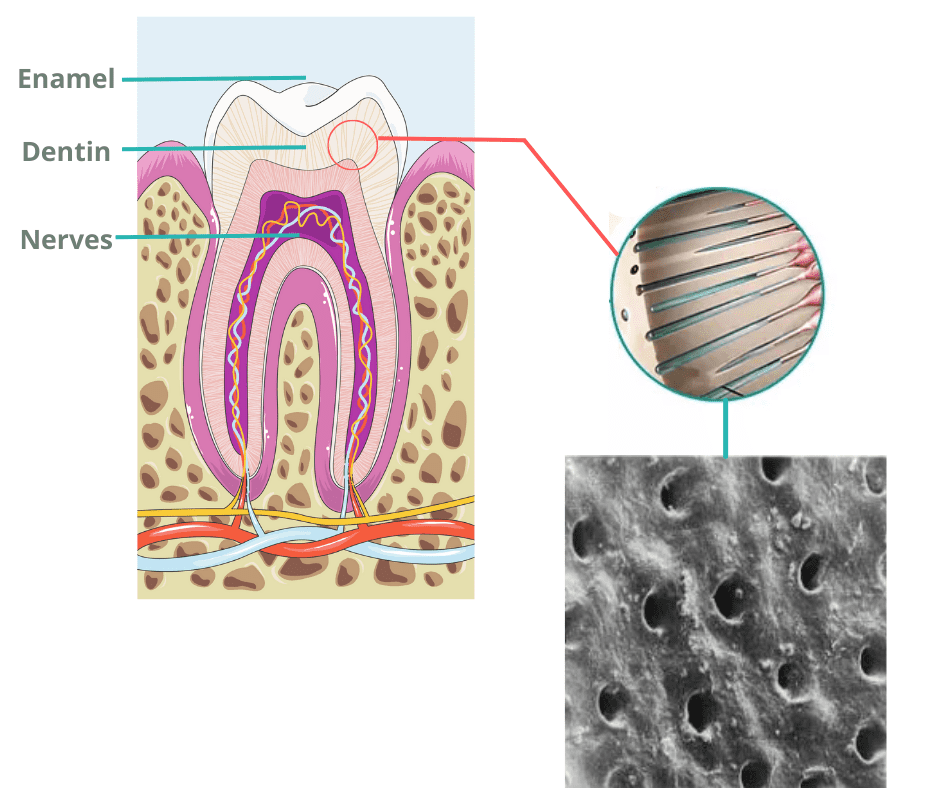
In addition, dentin contains tiny openings called dentinal tubules, which run from the outer surface of the dentin to the center of the tooth, where the nerves are located. There can be anywhere from 10,000 to 25,000 dentinal tubules per square millimeter.
When the dentin is exposed, stimuli like cold, heat, or sugar can travel through these tubules, reaching the nerves and triggering that sharp, sudden pain.
How Do Desensitizing Toothpastes Work?
Now that we understand tooth sensitivity, it’s easier to see how some toothpastes can help provide relief. There are two main ways they work.The most common active ingredient is Potassium Nitrate. It relieves sensitivity by numbing the nerves and blocking pain signals through the dentinal tubules. Essentially, it acts like an anesthetic, stopping the nerves from feeling pain.
Other desensitizing toothpastes work differently by remineralizing the tooth surface. Instead of numbing the nerves, they seal the tiny openings in the dentin with minerals, providing a protective shield. This prevents external stimuli from reaching the nerves. Active ingredients that serve this purpose include Strontium Chloride, Arginine-Calcium Carbonate, Stannous Fluoride, Novamin, and Nano-Hydroxyapatite.
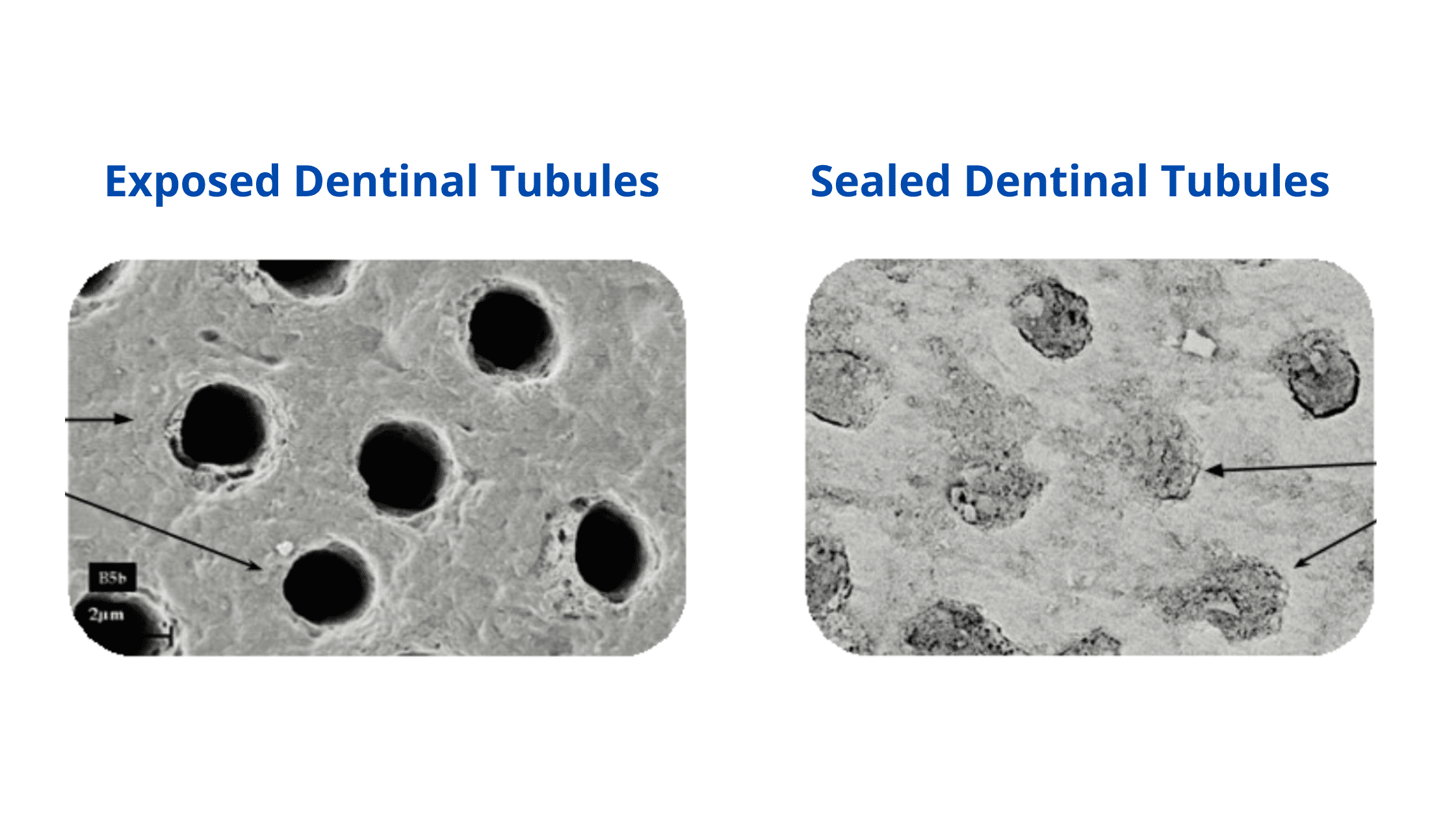
Both methods effectively combat sensitivity and bring relief, but consistent use over time is key to seeing improvement.
I personally recommend using anti-sensitivity toothpastes with remineralizing properties. Not only do they relieve pain, but they also rebuild the tooth’s surface with minerals, making it stronger and more resistant to future damage.
Best Toothpaste for Sensitive Teeth
Here are some of the top recommended toothpastes clinically proven to reduce tooth sensitivity:Sensodyne
Sensodyne is a clinically proven brand that’s highly recommended for relieving tooth sensitivity. Its active ingredients target sensitivity in two ways: numbing the nerves and remineralizing the tooth surface. Here are two of the top options:
1. Sensodyne Rapid Relief
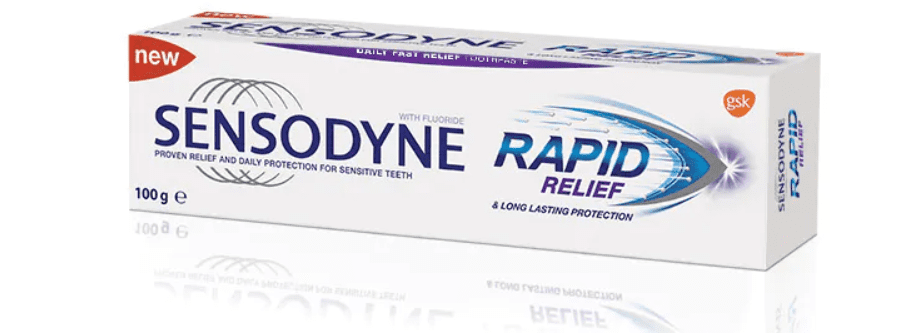
This toothpaste claims to relieve sensitivity pain in just 60 seconds. It contains stannous fluoride, which helps remineralize the teeth and forms a protective barrier over sensitive areas. Use it like a regular toothpaste, brushing twice a day for a full 2 minutes.
For faster results, you can apply a small amount directly to the sensitive areas and leave it on for 1 minute before brushing and rinsing.
2. Sensodyne Repair and Protect (Novamin)
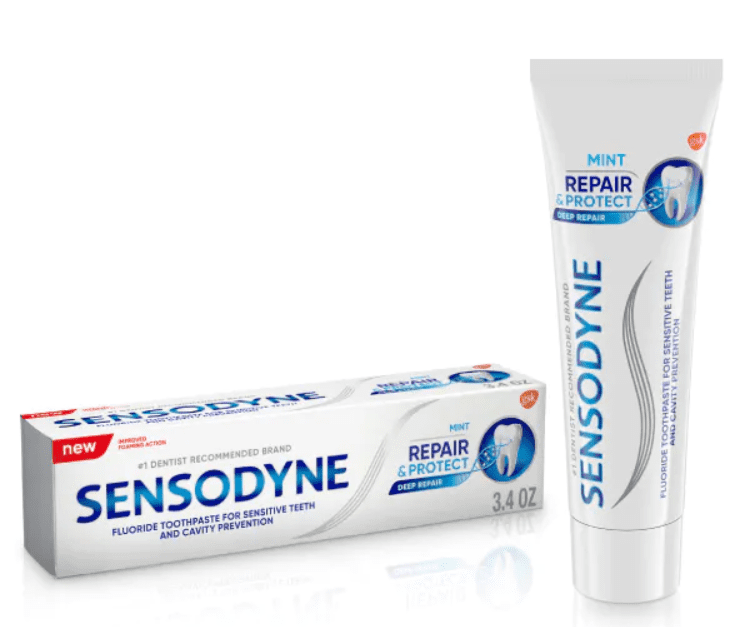
This toothpaste contains Novamin (calcium sodium phosphosilicate) as its active ingredient, a powerful remineralizing agent that can even reverse the early stages of tooth decay.
When it comes into contact with saliva, Novamin releases calcium and phosphorus, the essential building blocks of enamel and dentin. This process helps form a long-lasting protective barrier while remineralizing the teeth.
If you’re looking to treat sensitivity while also strengthening your enamel, Sensodyne Repair is an excellent choice.
Sensodayne toothpaste features:
- Rapid relief.
- Clinically proven.
- Designed for regular brushing to maintain long-term sensitivity relief.
- Contain fluoride
3. Tom’s of Maine Rapid Relief Sensitive (Fluoride-Free)
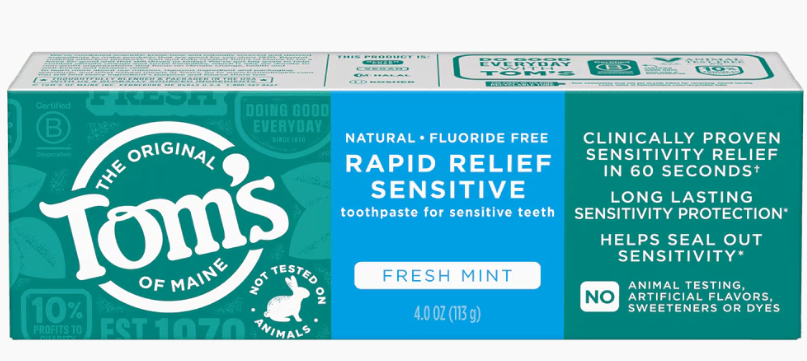
This is another clinically proven toothpaste that effectively reduces sensitivity. It uses the remineralizing agents arginine and calcium carbonate to seal exposed dentinal tubules and block the pain pathway.
Additionally, it is one of the least abrasive toothpastes and is gentle on enamel—an important thing to look at if you have sensitive teeth. Plus, it’s fluoride-free, making it a great choice for those who prefer fluoride-free options.
You can use it as your regular toothpaste or apply a small amount directly to the sensitive area, massaging for 1 minute before brushing and rinsing with water.
Tom’s of Maine Features:
- Clinically proven.
- Instant relief when applied directly to sensitive areas
- Long-lasting results with regular use.
- Fluoride-free
4. Parodontax Toothpaste Clean Mint:
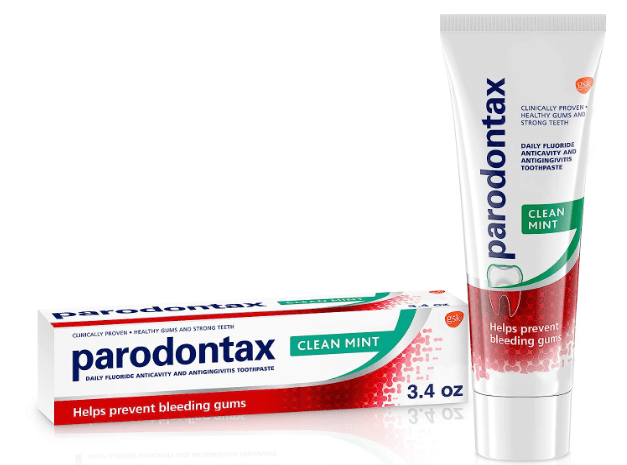
Parodontax Toothpaste is specifically designed to address gum disease and its symptoms, particularly bleeding gums.
It contains stannous fluoride, which offers dual benefits: antibacterial properties and sensitivity relief. What makes it great for sensitive teeth is its gentle, low-abrasive formula. This means it can effectively clean your teeth and gums without stripping away essential minerals like some highly abrasive toothpastes do.
Parodontax Toothpaste Features:
- Specialized in combating gum disease
- Contains stannous fluoride
- Gentle and less abrasive
- Promote gum health and provide relief for sensitive teeth
The Toothpastes to Avoid When Having Sensitive Teeth
While there are toothpastes specifically formulated for sensitive teeth, it’s important to be aware of those that may not be suitable.First, avoid whitening formulas, as they often contain abrasive agents and hydrogen peroxide, which can be harsh on sensitive teeth and lead to further irritation and discomfort. These abrasive agents can wear down enamel and expose dentin, potentially worsening sensitivity.
Toothpastes containing tartar or plaque-control ingredients also tend to be abrasive and tough on natural teeth.
Ultimately, when choosing a toothpaste, look for products specifically labeled for sensitivity relief. These formulas are designed to be gentle and typically contain active ingredients that alleviate sensitivity without causing further irritation.
Things to Consider When Dealing with Sensitive Teeth
Before starting any desensitizing treatment at home, there are a few important factors to consider and dental conditions to rule out.- Visible Dental Injuries: If your sensitivity is caused by a visible issue (such as a crack, chip, or cavity), it’s essential to have it treated by your dentist as soon as possible. These conditions require professional attention and cannot be resolved at home with a simple toothpaste. Ignoring cavities can lead to further complications, such as infections, abscesses, and tooth loss.
- Dental Check-up: It's advisable to schedule a dental check-up to ensure no underlying dental issues are contributing to your sensitivity. Your dentist can examine your teeth and gums to identify potential causes and recommend appropriate treatments. Remember, effective dental treatment starts with identifying the root cause.
Best Practices for Sensitive Teeth
In addition to using the right toothpaste, incorporating some good habits can enhance your results:- Brushing Technique: Pay attention to your brushing method. Use a soft-bristled toothbrush and gentle, circular motions to prevent further enamel wear or gum irritation. Avoid brushing too aggressively, as this can increase your discomfort.
- Diet: Be mindful of your diet, particularly foods and beverages that may trigger sensitivity. Limit or avoid highly acidic or sugary items, as they can erode enamel and worsen sensitivity. A healthy, balanced diet benefits not just your overall well-being but also your dental health.
- Teeth Grinding: If you grind or clench your teeth (a condition known as bruxism), it’s important to address it. Grinding can wear down enamel and expose dentin. Your dentist may recommend a nightguard or other strategies to help manage this habit.
When to See Your Dentist?
If your tooth sensitivity continues to bother you even after using a sensitive toothpaste consistently, it may be a sign of an underlying dental issue that requires professional attention.In such situations, your dentist can provide more advanced in-office techniques to help resolve your sensitivity. These may include:
- Highly Concentrated Numbing Agent: Your dentist may use a highly concentrated numbing agent to temporarily alleviate sensitivity and provide relief.
- Fluoride Varnish: This highly concentrated fluoride preparation creates a protective barrier against sensitivities and further damage.
- Sealing Dentinal Tubules: In-office procedures can involve the application of a filling material to seal the exposed dentinal tubules, providing long-lasting relief.
- Gum Graft: If receding gums are the cause of your sensitivity, a gum graft procedure may be recommended to cover the exposed roots.
- The diameter and number of dentinal tubules in rat, cat, dog and monkey. A comparative scanning electron microscopic study - PubMed (nih.gov)
- Remineralization Effect of Topical NovaMin Versus Sodium Fluoride (1.1%) on Caries-Like Lesions in Permanent Teeth - PMC (nih.gov)
- Is there evidence for Novamin application in remineralization?: A Systematic review - PMC (nih.gov)
- Toothpaste-Abrasiveness-Ranked-by-RDA.pdf (williamsonperio.com)